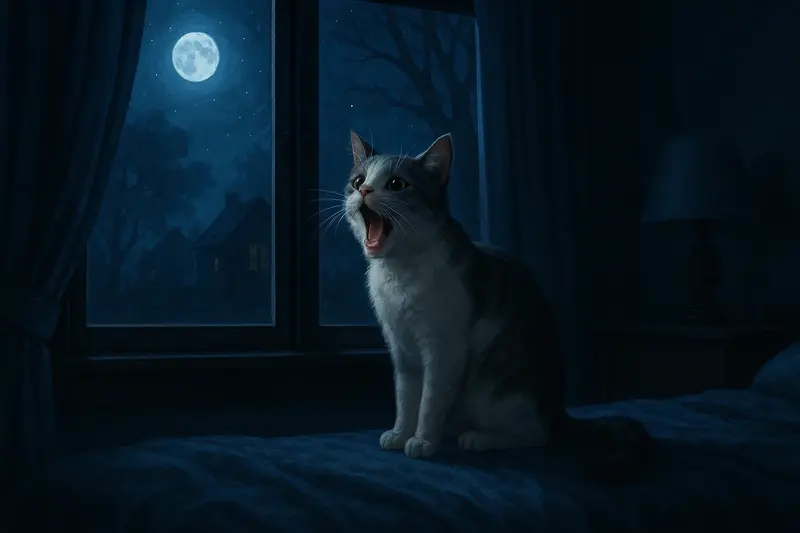Is your cat keeping you up at night with non-stop meowing or pacing around the house? You're not alone. Many cat owners are familiar with midnight zoomies and loud yowling that disrupt sleep. But what causes this behavior, and how can it be resolved? As a pet expert, I’ll walk you through the behavioral, physical, and emotional reasons behind nighttime meowing—and what you can do about it.

Cats are crepuscular creatures, meaning they're most active during dawn and dusk. Though domestic cats adapt to human routines, their ancestral instincts often persist.
If your cat sleeps all day or doesn't get enough playtime, they may have a surplus of energy at night, leading to vocalizations out of boredom or to seek attention.
Unspayed or unneutered cats tend to vocalize excessively during mating seasons. Night yowling is a common sign of estrus.
Some cats cry at night when they're hungry or simply craving tastier food than what’s offered.
A lack of companionship, changes in environment, or long periods of isolation can lead cats to vocalize more at night as a call for comfort.
Conditions such as hyperthyroidism, arthritis, cognitive dysfunction, or dental pain can cause restlessness and increased vocalizations at night.
Rolling or rubbing against surfaces? Likely in heat
Circling food bowl? May be hungry
Calling while seeking your attention? Possibly lonely
Note when the meowing occurs—after lights go out? Before sunrise? Regular patterns can provide clues.
Check for:
Bad breath, gum redness
Vomiting or diarrhea
Weight loss or lethargy
When in doubt, consult a veterinarian to rule out medical conditions.
Interactive playtime for 30+ minutes daily
Install cat trees or shelves for enrichment
Offer a larger meal before bedtime
Consider using an automatic feeder for early morning hours
Sterilization significantly reduces night-time vocalization related to mating behavior.
Close bedroom doors and encourage independence
Dim or eliminate excess lighting
Provide cozy beds or quiet hiding spots
Resist the urge to feed or play with your cat in response to night-time meowing, which can reinforce the behavior. Gradually decrease responses.
Elderly cats with cognitive dysfunction may become disoriented or anxious at night, resulting in loud, confused meows. Use night lights, and maintain a stable routine.
If your cat suddenly starts yowling at night and it’s uncharacteristic, this could signal pain, injury, or a medical emergency like a urinary blockage. Seek immediate veterinary help.
Night-time meowing in cats can often be addressed with a combination of understanding, environmental adjustments, behavior training, and medical care.
With the right approach, you and your cat can both enjoy restful, quiet nights—and a happier bond during the day.
animal tags:
We created this article in conjunction with AI technology, then made sure it was fact-checked and edited by a Animals Top editor.